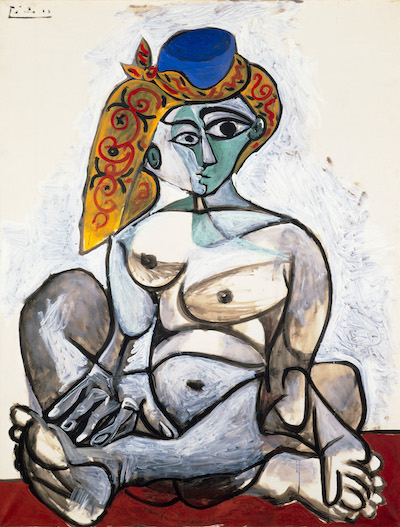The Picasso Century: a Melbourne Masterclass series
Presented in partnership with NGV's Melbourne Winter Masterpieces® 2022:
The Picasso Century
Wednesday 6 July | Wednesday 20 July
The masterclass series has now BOOKED OUT.
Email arts-tickets@unimelb.edu.au to be placed on the wait list.

About the Masterclass series
As part of the University of Melbourne's Learning Partnership with The Picasso Century, the Faculty of Arts will again present our popular annual Melbourne Masterclasses. Over two sessions experts from the Faculty will offer insights and critical discussions on Picasso and his fellow artists, exploring both the revolutionary advances in visual culture and the ongoing influence of the modernist movement.
Masterclass attendees will enjoy:
- stimulating presentations from Dr Jane Eckett (6 July - BOOKED OUT) and Associate Professor Anthony White (20 July - BOOKED OUT); both hosted by Associate Professor Alison Inglis.
- refreshments in Federation Court;
- exclusive after-hours access, allowing you to explore the exhibition with a fraction of the usual crowds;
- and a 20% discount on all NGV Membership categories for first-time and renewing members.
The masterclass series has now booked out. Email arts-tickets@unimelb.edu.au to be placed on the wait list.
Pablo Picasso
Spanish 1881–1973, worked in France 1904–73
Nude in a Turkish cap (Femme nue au bonnet turc) 1 December 1955
oil on canvas
116.0 × 89.0 cm
Centre Pompidou, Paris, Musée national d’art moderne-Centre de création industrielle
Donated by Louise and Michel Leiris, 1984 (AM 1984-637)
© Succession Picasso/Copyright Agency, 2022
Photo © Centre Pompidou, MNAM-CCI/Service de la documentation photographique du MNAM/Dist. RMN-GP

Picasso mid-century: politics and legacies - Wednesday 6 July
**Please note, this session is now booked out. Email arts-tickets@unimelb.edu.au to be placed on the wait list.**
At the outbreak of World War II, Picasso was already an avant-garde veteran with a 40-year retrospective opening at New York’s Museum of Modern Art in late-1939. Lauded on both sides of the Atlantic as the chief instigator of Cubism and intimate of Parisian Surrealist circles, his political views now also marked him as an anti-Fascist crusader. Despite being dubbed degenerate by the German occupiers, he chose to remain in Paris throughout the war, working though not exhibiting. After the city’s liberation he emerged as a leader of the artistic resistance, a newly subscribed member of the French Communist Party, and an ambassador of post-war peace. From the blunt protest of Massacre in Korea (1951) to the nudes and studio interiors painted in the south of France, Picasso’s aesthetic choices were continually shaped by shifting political forces. This masterclass will explore the artistic possibilities for Picasso and his circle of friends during one of Europe’s most politically turbulent periods.
Presented by Dr Jane Eckett
Jane Eckett is an art historian, curator and Postdoctoral Research Associate in the School of Culture and Communication at the University of Melbourne. She holds a Masters of Letters (MLitt) from Trinity College Dublin and a PhD from the University of Melbourne, awarded in 2017. Her research focuses on modernist sculpture, public art and memorials, diaspora art and émigré networks. She has worked as a sessional lecturer in art history at the University of Melbourne since 2010 and regularly speaks in public, most recently delivering the 2019 annual Duldig Lecture.

Against imitation: Picasso's Cubist revolution - Wednesday 20 July
**Please note, this session is now booked out. Email arts-tickets@unimelb.edu.au to be placed on the wait list.**
Pablo Picasso’s principal claim to fame is the work he produced during his so-called “high cubist” period of 1909 – 1914. In these years, the artist completely revolutionised the history of western art. Picasso produced paintings inspired by non-western art forms including African sculpture. He introduced mass cultural artefacts, such as newspaper and wallpaper, into the highly privileged domain of easel painting. His work at this time also reflected the rapid industrialisation of the modern world by incorporating geometric forms with the appearance of mechanical objects. Moreover, Picasso demonstrated in these years that the traditional language of painting had something arbitrary about it. Contrary to a long-standing assumption of European art, he showed that it was possible to create artworks which looked totally unlike what they depicted. As a result of Picasso’s radical subversions of artistic tradition, the history of art was set on a new course.
Presented by Associate Professor Anthony White
Anthony White is an Associate Professor in the School of Culture and Communication at the University of Melbourne. His research focuses on the history of modern and contemporary art. He has published several books, including Italian Modern Art in the Age of Fascism (Routledge, 2020), and his writing on modern art has been published widely in leading peer-reviewed journals. He is a frequent recipient of research awards from the Australian Research Council (2018, 2012, 2007) and has held several appointments at major institutions including Harvard, New York University and the Centre of Visual Art at the University of Melbourne.
Schedule
Wednesday 6 July and Wednesday 20 July
6.00pm-6.15pm | Arrival and registration. |
6.15pm-7.30pm | Masterclass presentation and audience Q&A. |
7.30pm-7.45pm | Break for refreshments. |
7.45pm-9.00pm | Exhibition viewing time. |
9.30pm | NGV Design Store closes. |
Ticket information
$70 General admission / $65 University of Melbourne alumni, staff, and students
Price covers one masterclass, including refreshments and exhibition entry, and is GST inclusive.
Please note, the masterclass series now booked out. Email arts-tickets@unimelb.edu.au to be placed on the wait list.
For accessibility information and ticketing terms and conditions, please visit our Frequently asked questions web page.
Questions?
See our FAQ page for more information on all our Community Education courses.
Have a question that hasn't been answered?
We'd be happy to help. Contact us at arts-tickets@unimelb.edu.au